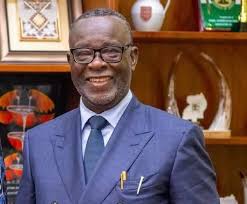68-year-old Justice Paul Kwadwo Baffoe-Bonnie, the Acting Chief Justice, would today, Monday November 10, 2025, appear before the Appointments Committee of Parliament as a Chief Justice Nominee for vetting to become the substantive Chief Justice of Ghana, if approved by Parliament.
The vetting exercise is scheduled to commence at 11:00 am prompt and is strictly by invitation, according to a statement issued by Parliament.
Last Friday in Parliament, Minority Leader Osahen Afenyo-Markin filed a motion that requested the House to not go ahead with today’s Vetting of Justice Baffoe-Bonnie because the former Chief Justice, Gertrude Torkornoo, had filled a process at the Courts challenging the legitimacy of her removal.
Afenyo-Markin’s argument was that his Caucus objects to Parliament vetting the President’s nominee for the Chief Justice position at a time the former Chief Justice was still seeking the intervention of the Courts and that at best Justice Baffoe-Bonnie should be vetted only after the Courts have ruled on the reliefs being sought by the former Chief Justice.
The Speaker, Alban Bagbin, ruled against the argument of Afenyo-Markin and said today’s vetting of Justice Baffoe-Bonnie should go ahead.
“There is no constitutional or standing order basis for Parliament to halt the process simply because there are pending cases in court,” the Speaker said.
“Should I accept that argument, it would mean that any litigant could hold Parliament hostage by filing a case and freezing the work of Parliament and its committees. The motion is inadmissible and has been returned to the sponsor, the Minority Leader, Honourable Alexander Afenyo-Markin”, Speaker Bagbin ruled.
The Speaker said Parliament is fully fortified under article 144(1) of the Constitution to consider the President’s nomination for Chief Justice
“That duty is not conditional on event elsewhere; there is no constitutional or Standing Orders basis for Parliament to halt the process simply because there are pending cases in court.
“Should I submit that argument, it will mean that any litigant could hold Parliament hostage and freeze the work of Parliament and its committees.
“And that will undermine the concept of separation of powers and paralyse the constitutional machinery fulfilling, in this particular case, key offices of state,” he said.
Justice Paul Baffoe-Bonnie
Justice Paul Baffoe-Bonnie is a seasoned Ghanaian jurist with an extensive legal career spanning over three decades.
Born on December 26, 1956, he has had a distinguished career serving in various capacities across Ghana’s judicial system, culminating in his appointment as a Justice of the Supreme Court of Ghana in 2008 – a position he still holds.
Justice Baffoe-Bonnie previously served as a Justice of the Court of Appeal and High Court and a Circuit Court Judge.
Before joining the Bench in 1992, he worked as a Principal Inspector of Taxes, and Head of Legal – Eastern and Volta Regions at the IRS. And before then, Deputy Superintendent of Prisons and Head
of Legal at the Prisons Service -Headquarters.
A graduate of the University of Ghana and the Ghana School of Law, Justice Paul Baffoe-Bonnie, is an alumni of Konongo-Odumase Secondary School where he obtained is O’ and A’ level certificates.
Justice Paul Baffoe-Bonnie is an influential figure in legal education and judicial reform who has served on several committees.
He is also actively involved in national and international discourse, attending numerous conferences and contributing to judicial publications particularly in Election Law.
Justice Paul Baffoe-Bonnie’s expertise spans constitutional law, judicial ethics, taxation, prison administration, election law and legal education with special emphasis on election and electoral laws.
His experience also extends to international judicial cooperation, having participated in global conferences and capacity-building initiatives.
Justice Baffoe-Bonnie is known for his excellent leadership skills, dedication to judicial excellence, and commitment to upholding the rule of law in Ghana.
He is renowned for his integrity, commitment to justice, and leadership in judicial reforms. He is a mentor to many within the judiciary and an advocate for continuous professional development and ethical practice.


Comments are closed.